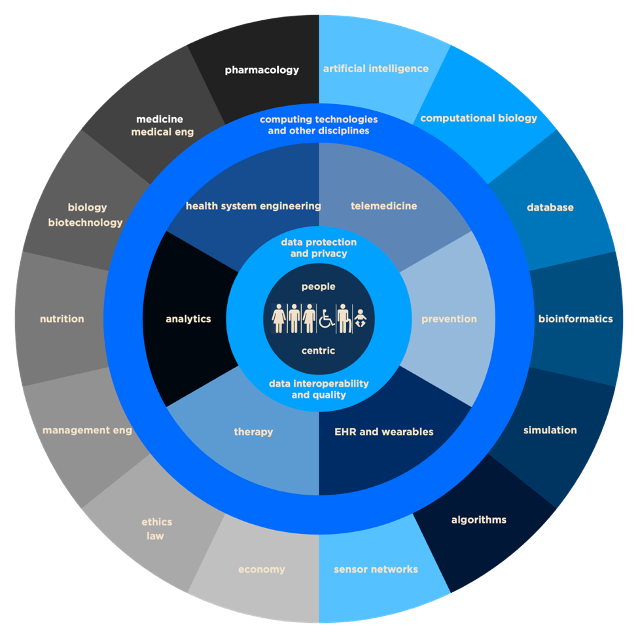
VISION: The Digital Health National Lab will be the reference for digital health national initiatives in five years to improve people’s healthcare experience and enhance efficiency and effectiveness of healthcare delivery.
MISSION: The Digital Health National Lab integrates many different skills and data types usually siloed to enhance healthcare research and operations with actionable tools that improve people health and quality of life.
Digital health is a broad term that covers
1. telemedicine (interpreted as distance monitoring of patients and digital interaction with healthcare providers),
2. prevention (and precision) operated through digital technologies,
3. electronic health records to have access everywhere to the clinical history of patients and wearable technologies to collect physiological parameters,
4. digital therapies and computational development of therapies or in-silico design, testing or repurposing of drugs,
5. health system engineering to optimize the operations and costs of healthcare systems to enhance the quality of the service,
6. analytics to make medicine predictive and preventive by exploiting the data in national repositories to develop biomarkers and research hypotheses both on clinical outcomes, readmissions, hospitalization risks, therapy adherence.
The six pillars of digital health are reported in the third inner circle of the figure.
Digital health is people centric. DHNL vision and mission is to improve the healthcare experience for the society as a whole and empower people to pursue a healthier lifestyle as well as to better manage health conditions. The mission is also to help personalized, preventive, participatory medicine and make research results actionable. Data from many different siloes is needed to implement DHNL mission. People are the data producer and data owner. The one-size-fits-all paradigm of medicine it is no more working to adhere to individual’s needs. The All of us program launched in the US is a great example of what we need to really implement precision medicine; and without digital support it is simply impossible. We have to make clear with measurable results that the sharing of personal data is improving the health outcome of the society (my data save other lives and allow me to receive better treatments). To achieve this goal, the concepts of “precision” and “prevention” are essential in both medicine and environmental exposures including nutrition and food.
People are willing to share their data if they consider the recipient to be trustworthy and effective, feel that all measures to ensure data protection are in place and their privacy is guaranteed. This is the reason of having the data protection and privacy firewall around people in the concentric circles showing the context in which we want to operate.
To extract the highest added value from the collected data, data interoperability and quality must be ensured. Medical data is most of the time coming from different hospital wards, clinical ambulatory or research labs that use different digital standard or even terminology for the same measure. This limits the sharing and usability of the data. The interoperability and quality control of the data is a major step towards a widespread dissemination of digital health technologies. Digital health requires many computing fields (blue background in the outer circle) as well as many non-computing disciplines (grey background in the outer circle).
Role: DHNL will enable large digital health projects and orchestrate collaborations between University and CNR nodes to make these projects successful. It will catalyze investments in digital health and will help nodes to increase their funding and improve their research quality and impact. The advantage of orchestrating national initiatives is that DHNL keep focusing on well defined, measurable, short-term goals to implement a long-term vision. This produces the best results for the national research system with an optimal allocation of resources.
Goal and added value: the goal of DHNL is to develop solutions for people and healthcare systems that will be industrialized by other actors that cooperate with the lab. The competitive advantage of DHNL is the national scale at which it can operate and the broad range of skills and expertise that groups under common goals, language and expectations. The advantage of individuals is that they can approach real scale problems that are too big for single University or CNR departments and they can produce better research results and better publications. DHNL is a facilitator for acquiring competitive grants at national and international level and can help participants to grow their skills, visibility and network in the international digital health community. Double affiliation with a successful initiative bursts personal growth.


